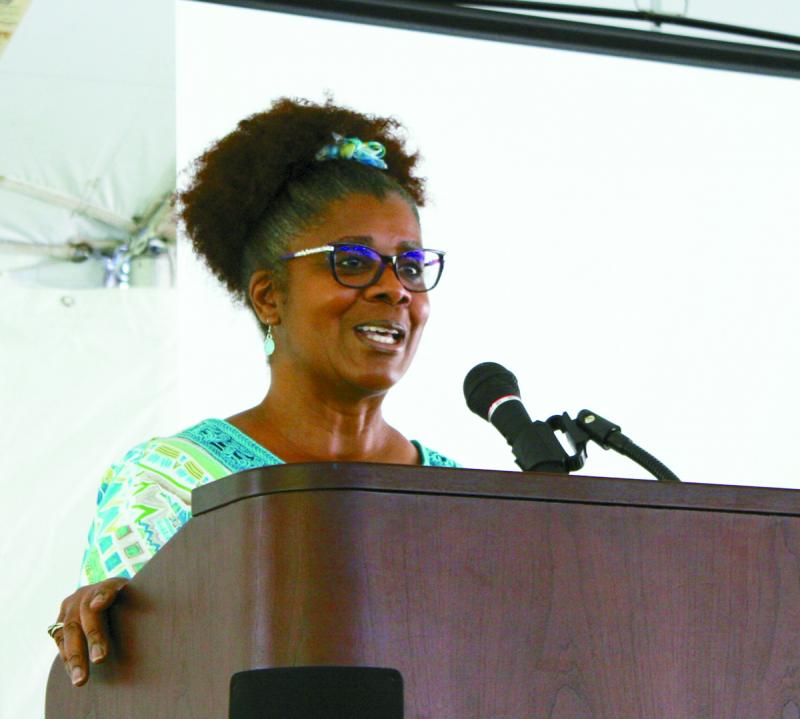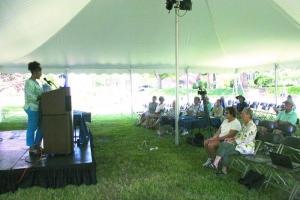A family’s side hustle in Lewes – a home-based speakeasy – brought them into leadership of a community gathering place for the city’s Black community, where they ran a must-see show featuring regional and national talent. And then it all ended in a fire.
That was the story shared by Lewes resident Trina Brown-Hicks, who spoke about the history of the locally renowned Happy Day Club Sept. 9 at Zwaanendael Park. Her memories were part of the 24th annual Chautauqua event put on by Delaware Division of Historical and Cultural Affairs.
Brown-Hicks knows the story of the club well, as her grandparents, Marshall Lockwood and Beatrice Williams, owned it, and later her parents, Isaac and Beatrice Brown.
At 58, Brown-Hicks is not old enough to have many memories of the club’s glory days, but she told its story with the help of her older sister Deborah Robinson. Robinson couldn’t come because of a family medical issue, but she wrote out some of her memories, which Brown-Hicks read to the audience.
The club wasn’t just a fun gathering spot: It was a place African Americans could come during segregation to get physicals and immunizations they couldn’t get at the hospital, Brown-Hicks said.
And it was a safe place at a time when they weren’t welcome in white spaces. Robinson recalled living through segregation in the 1940s and ’50s when she was young.
“I remember having to go to the kitchen entrance or an employees’ door of a restaurant to purchase a sandwich or a meal to take out, or having to stand at the corner counter of the drugstore in order to receive an ice cream cone or a sundae to take out,” Robinson, who was born in Lewes, wrote. “I could not sit at the counter.”
But her grandfather provided a space to socialize at his home, she said. This was before he took over the Happy Day Club.
It made for an interesting childhood. “I did not think it was unusual to have a jukebox in the living room,” Robinson wrote.
The family pitched in to help. While her grandfather toted in liquor and her grandmother prepared chicken for sandwiches, Robinson and her sister had the job of putting beer in the icebox to chill. Then they got ready for church, another key community hub, where her mother ushered and her grandmother sang in the choir.
After church, “company” would come over every Sunday, and the children would be hustled out of the house. Her mother, Robinson said, told them “it was not an environment for young ladies.”
Technically, it was not a legal environment for anyone.
“Running a speakeasy was illegal, but the officials always looked the other way,” Robinson wrote. That is, until times changed and officials finally felt they had to step in. They arranged for Lockwood to buy the old Robinson’s Coliseum building at Fourth and DuPont streets. This building had already been a place for meetings, music, healthcare and more, according to the Hagley Museum and Library.
Under the family’s management, the club remained a social hub. It hosted civic organizations and attracted bands, exotic dancers and singers from all over the Eastern Shore, Robinson said, and it was always packed.
“If you missed the show, your friends spent days gloating about what you had missed,” she wrote.
The club brought in talent like blues guitarist Little Freddy King; the Upsetters (Little Richard’s backup band); James Brown (before he was a big deal); and pianist Fats Domino, Brown-Hicks said.
She dreamed of growing up to run it herself and improve it, and went to college for a business degree to make that possible. But before she could do that, the club burned down in August 1982.
“I was so devastated,” she said.
Isaac Brown, her father, told the Wilmington Morning News that the fire may have been caused by lightning. The deputy fire marshal, the paper reported, said it wasn’t clear how the fire started, but it wasn’t suspicious.
The building is gone, but memories remain.
“Every time I talk to people who are in their 70s and 80s, they tell me about the Happy Day Club and what a good time they had,” Brown-Hicks said.
Those gathered to hear her stories Friday appeared to have a good time as well.
“I love to hear her presentations,” said Rachel Grier-Reynolds of Lewes, who is a commissioner on the city’s African American heritage commission. “And she has interviewed so many people in town … several of them who have now passed away, to capture their stories.”
Devon Filicicchia, lead historical interpreter at the Zwaanendael Museum, said though she lives in Lewes, she had not heard of the nightclub.
“When we heard that she had all of these wonderful stories from her family, and the family connection, we absolutely knew it was something we wanted to bring to the public,” she said.
“It’s all oral history. And it’s so important to preserve and save those oral histories.”





















































